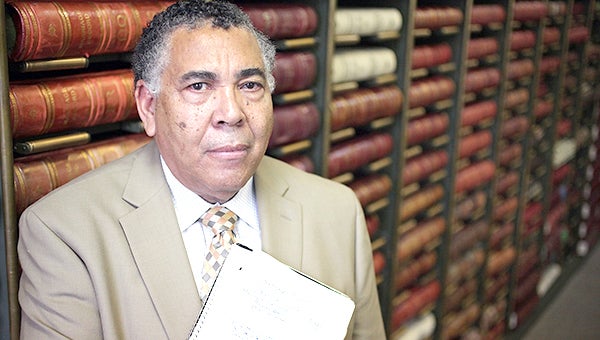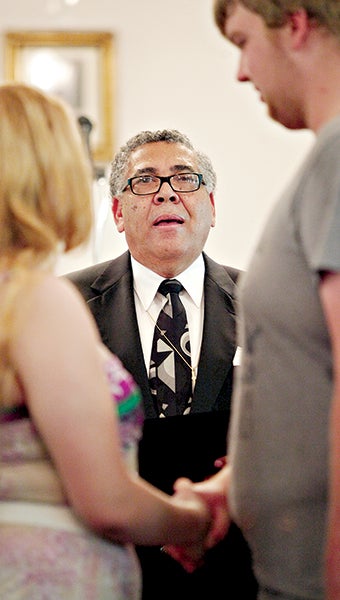Williams has married more than 300 couples
Published 1:00 am Sunday, June 8, 2014

The Rev. Johnny Williams, who has conducted more than 300 marriages in Warren County, holds his self proclaimed “Book of Love” in front of a wall of marriage records in the Circuit Clerk’s office in the Warren County Courthouse. His book contains the name of everyone he has ever married since 1986. (Justin Sellers/The Vicksburg Post)
The Rev. Johnny Williams’ business card might as well be inscribed with “have weddings — will travel.”
Williams performed his 307th wedding Friday as part of a long career of uniting couples in holy matrimony. The weddings have been in the Warren County courthouse, in his back yard, in churches, just about anywhere.
They are all, of course, in his free time when he’s not pastoring two churches or swearing in witnesses in Warren County Circuit Court.
Each of the weddings is recorded in a spiral-ring notebook and the entries represent an astounding cross section of Mississippi society — celebrities, the rich, the poor, and people of all skin colors.
“I call it my Book of Love,” said Williams, who became a minister in 1986 and performed his first ceremony that August.

The Rev. Johnny Williams, who has conducted more than 300 marriages in Warren County, marries Kristen and Joseph Gill of Delhi, La. at King David M.B. Church #2 on Bowmar Avenue in his 307th marriage he’s conducted. (Justin Sellers/The Vicksburg Post)
The Book of Love filled up slowly at first but really began to take off once Williams joined the staff of the Warren County Circuit Clerk’s office in 2002. One of the responsibilities of that office is issuing marriage licenses, and couples that come in don’t always have a minister in mind to perform the ceremony.
In 2009, the numbers peaked as he performed 32 weddings ceremonies, and in 2010, he joined together 27 loving couples.
“I don’t feel like anyone here has reached that number yet, but there are those who are close,” he said.
This year, he’s on pace to break his personal record and has already performed 16 weddings with three more weeks of June remaining.
On Friday, Williams married Kristen and Justin Gill of Delhi, La., at King David Baptist Church No. 2 on Bowmar Avenue.
Williams pastors that church and Mount Ararat Baptist on Culkin Road.
The couple and about five family members were on hand for the ceremony between the 20-year-old groom and his 16-year-old bride. In Louisiana, a 16-year-old cannot be married, even with parental permission. So they came to Mississippi for a quick wedding before leaving immediately after the ceremony for Pennsylvania where Justin Gill will work in pipeline construction.
“It’s a 20 hour drive,” the young bride said after the short ceremony.
They went to the Warren County Circuit Clerk’s office to get their marriage license, and called Justice Court, hoping one of the judges would do the ceremony, Justin Gill said.
But when none of the judges could make it in their time frame, someone in the clerk’s office suggested calling Williams.
Within a few minutes, they were at his church getting married.
“Most of my weddings come by referrals,” Williams said.
Williams recorded their names in the Book of Love. Some of the other names include those of his own children, NFL quarterback Steve McNair, locals and out-of-towners.
Not all the marriages work out, though Williams estimates about two-thirds of the couples are still together.
“I’ve had some hits and some misses,” he said. “It should be something where the union is united by the spirit. You can almost pick the ones who will continue on.”
The small size of Friday’s ceremony is typical of many modern-day weddings, he said. Some of his ceremonies have involved only the bride and groom. Others have had packed crowds of 300 or more. Most of the ceremonies are performed before just a handful of close friends and family.
“Those traditional white dress weddings are almost gone now,” Williams said.
One tradition that has returned, though, is getting a marriage license and getting married on the same day. In 2012, the state removed a three-day waiting period on marriage licenses. The same-day license and wedding were common in the early 20th century, according to marriage records in the Circuit Clerk’s Office.
“Its come full circle,” Williams said.
Williams is also keeping alive a tradition that began in the early part of the 20th century by the Rev. A.D. Reid, a black preacher who was known for the amount of weddings he performed.
“He hung out at the courthouse and married people for $0.50 or a $1,” Williams said.
Unlike Williams, Reid never performed a ceremony for a white couple. It was strictly forbidden.
Until 1971, marriage records were separated by race. One set of books is simply labeled “marriage records” the other is labeled “marriage records, colored.” Interracial marriage was illegal.
“It was forbidden, and it still is some people’s eyes,” Williams said, adding that he’s performed a handful of interracial marriages, as well as marriages for white, black, Indian and Hispanic couples.
Williams and his wife, Brenda, were married Sept. 20, 1969. Their marriage is forever listed in one of the many red leather-bound books marked “colored” in the records room of the clerk’s office.





